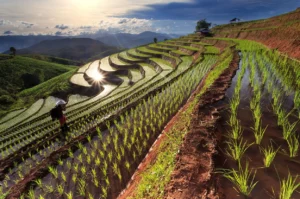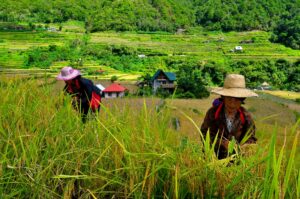
Consumers in Tamil Nadu, a predominantly rice-growing state in India, who preferred millet grains, particularly finger millet, for hundreds of years, have shifted to rice because it is considered a status symbol.
Rice is important and will continue to play a vital role in food security for millions of people in India. The future of Indian food security and foreign exchange through rice exports will also largely depend on desired production and productivity.
Opportunities are great for attaining high yield in rice through proper agronomic management practices, low-cost mechanization in seeding and weeding, and suitable establishment techniques. The need for increased food production at prices affordable to consumers and profitable to farmers has been a concern for all.
Tamil Nadu has been recently dominated by the industrial sector compared with other states. Rice is grown in all of Tamil Nadu’s 30 districts comprising a total rice area of 2.05 million hectares. For example, in Dharmapuri and Krishnagiri districts, located in the northwestern agroclimatic zone of Tamil Nadu (see map), rice is the staple food crop. It is cultivated on 65,000 hectares in spite of a lack of water and labor resources, the high cost of cultivation, and less profitability. These two districts are situated near industrial cities, which lure farm laborers with high wages and stipulated work hours.
Industrialization led to increased labor migration to city areas and a shift toward alternative rural employment, and caused a severe farm labor shortage. Consequently, it also increased the cost of labor during peak farming operations such as transplanting, weeding, and harvesting.
In Tamil Nadu, transplanting is traditionally done only by women. The task is labor-intensive and cumbersome.
The major farm activities such as preparing and managing the nursery, pulling out seedlings, transporting and distributing them to the main field, and transplanting them consume 25–30% of the total cost of cultivation in transplanted rice. Moreover, expansion of irrigated area, the availability of short-duration high-yielding rice varieties, availability of herbicides to control weeds, increased transplanting costs, and declining profitability of rice production have forced many farmers to shift from transplanting to direct seeding on puddled and leveled soils under irrigated conditions. For this, a drum seeder, a wetland implement, greatly helps the rice-farming community by directly sowing germinated rice seeds, in lines, in the field.
Dr. Budhar is a professor of agronomy at the Regional Research Station, Tamil Nadu Agricultural University, India







